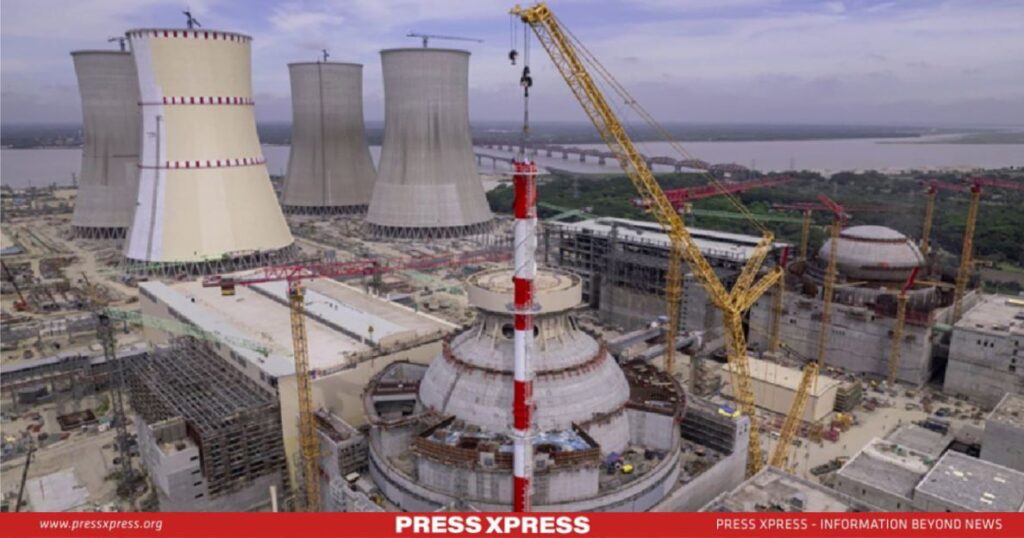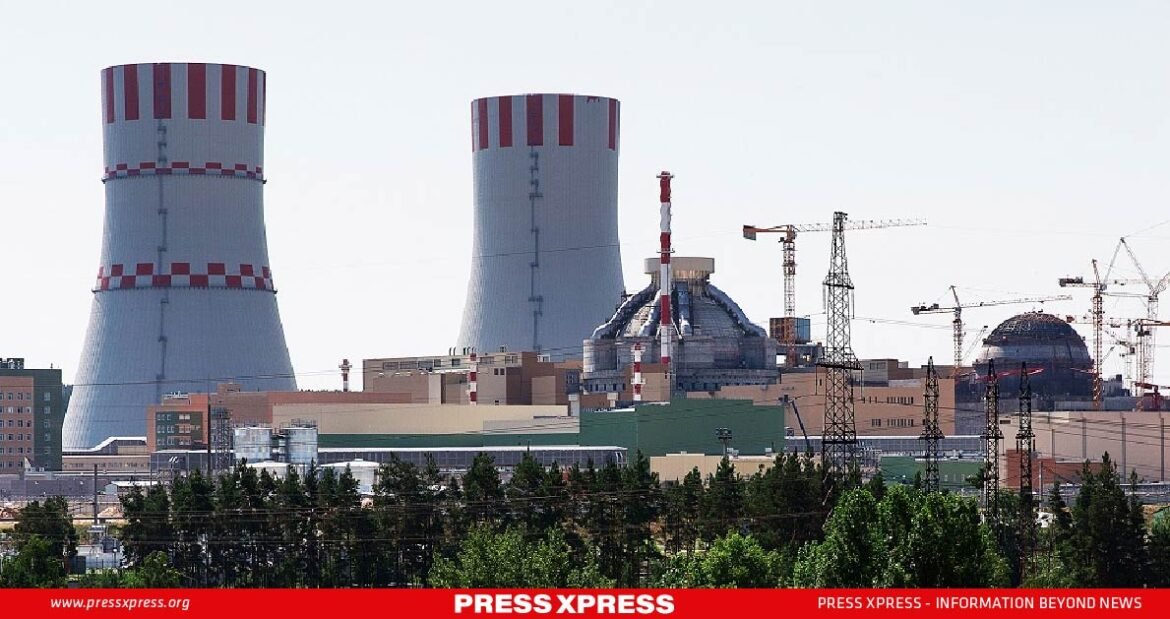In light of the recent US sanctions targeting Russian banks, Bangladesh faces a pressing challenge in settling its outstanding financial obligations amounting to $587 million for loans associated with the Rooppur Nuclear Power Plant Project. This urgency is compounded by the imposition of a 2.4% penalty by Russia on delayed payments, as disclosed by sources within the finance ministry.
You can also read: Bangladesh Outperforms India and Pakistan in SDGs
Bangladesh has proactively suggested to Russia various alternative methods for addressing these dues. Rather than immediate cash payments, the proposal includes options such as investing the due amounts in new projects, engaging in stock market investments, or purchasing goods directly from Bangladesh.
Negotiations with Russia Begin
Of significant concern is the first principal repayment installment of the $12.65 billion Russian loan, originally scheduled for March 2027. Bangladesh has sought a deferment of this payment until 2029, underscoring its current financial constraints exacerbated by external sanctions.
Efforts to negotiate a viable solution are underway, with the Economic Relations Department (ERD) preparing to engage in discussions with Russian counterparts imminently. The primary objective is to explore avenues that allow for the settlement of dues without incurring further penalties, considering Bangladesh’s restricted ability to conduct financial transactions involving sanctioned entities. While no specific repayment method has been finalized, Bangladesh remains optimistic that Russia will show flexibility in accepting alternative proposals.

In navigating the complexities imposed by US sanctions on Russian financial institutions, Bangladesh faces a critical juncture in managing its financial obligations concerning the Rooppur Nuclear Power Plant Project.
In a recent high-level meeting, Bangladesh Bank detailed its exhaustive efforts to find feasible transaction methods amidst the sanctions regime, highlighting the need for prompt alternative repayment mechanisms. One recommendation was for Russia to deploy the owed funds within Bangladesh, investing in critical infrastructure projects like a fuel oil refinery or exploring opportunities in the Bangladesh stock market. Direct trade payments to Bangladeshi exporters were also suggested to facilitate fund flow.
The Economic Relations Division (ERD) proposed converting the Rooppur project’s existing debt into financing for new initiatives, aligning repayment schedules with Bangladesh’s economic development and foreign exchange capabilities.
Technical and Sanction Hurdles Complicate Bangladesh’s Repayment
The government of Bangladesh is committed to resolving these issues swiftly, despite complications in payment methods. A bilateral agreement mandates loan interest payments through VEB.RF, a Russian institution now under US sanctions. Attempts to use China’s Industrial and Commercial Bank and settle in yuan have hit technical hurdles, further complicated by Bangladesh not adopting China’s CIPS system for international transactions. This delay coincides with China’s push to establish CIPS as an alternative to SWIFT.
CIPS vs. SWIFT Systems
- CIPS: China’s initiative as an alternative to SWIFT
- SWIFT: Entrenched role in facilitating international financial transactions
- Comparison Points: Adoption, readiness, and global usage
Currently, settling Russian debt in Chinese currency outside the SWIFT system is unfeasible, underscoring SWIFT’s entrenched role in international transactions. Bangladesh Bank Governor Abdur Rouf Talukder cautions against non-SWIFT transactions, citing CIPS’s readiness and potential US sanctions repercussions. Additional Director Mashiur Rahman highlights the complexity of payment delays, noting intensified US scrutiny on entities attempting to bypass sanctions.
Despite the government’s allocation of Tk100 crore to Sonali Bank, bureaucratic hurdles have delayed fund transfers, giving Russian authorities the impression that Bangladesh is struggling with its financial obligations. In response, the central bank provided $69 million to Sonali Bank on May 15, 2024, to settle debts with Russian contractors, showcasing a commitment to resolving these issues.
However, payment delays are straining finances and risking Bangladesh’s credibility with international partners. The government’s efforts to navigate sanctions and technical challenges are further hindered by internal inefficiencies. Streamlining these processes is essential to maintain trust and cooperation with Russia.
Progress and Financials (as of March 31, 2024):
- Physical Completion: 65.52%
- Total Expenditures: Tk71,089 crore
- Percentage of Total Cost Covered: 62.82%
- Estimated Total Project Cost: Tk113,093 crore
- Bangladesh Government Contribution: Tk22,053 crore
- Russian Loan Contribution: Tk91,040 crore
- Projected Project Completion: December 2025
Project Overview
On November 2, 2011, Bangladesh entered a significant intergovernmental credit agreement with Russia, initiating the Rooppur Nuclear Power Plant project. This culminated in a $12.65 billion general contract signed with JSC Atomstroyexport on December 25, 2015. According to Economic Relations Division (ERD) records, 90% of the loan finances the plant’s construction. Further, a $11.38 billion agreement between ERD and Russia’s Ministry of Finance, signed on July 26, 2016, solidified the project’s construction funding.
Project Inception and Agreements:
- Intergovernmental Credit Agreement Signed: November 2, 2011
- General Contract Signed: December 25, 2015
- General Contract Value: $12.65 billion
- Additional Contract for Construction Costs: July 26, 2016
- Additional Contract Value: $11.38 billion
The financing arrangement for the Rooppur Nuclear Power Plant spans a 7-year utilization period from 2017 to 2024, followed by a 30-year repayment period with a 10-year grace period. Semiannual principal payments of $189.66 million are due on March 15 and September 15 each year, totaling $379.33 million annually. As of March 31, 2024, the Rooppur plant’s physical completion is at 65.52%, with Tk71,089 crore spent, covering 62.82% of the estimated Tk113,093 crore total cost. The Bangladesh government has contributed Tk22,053 crore, with a Tk91,040 crore loan from Russia. The project is set to conclude by December 2025.
Utilization and Repayment Schedule:
- Utilization Period: 2017-2024 (7 years)
- Repayment Period: 30 years (including a 10-year grace period)
- Semiannual Payments: $379.33 million annually
- Per Installment: $189.66 million
- Payment Dates: March 15 and September 15
The milestone of receiving the first shipment of nuclear fuel from Russia on 28 September 2023 marked a pivotal moment, officially commemorated during a virtual ceremony on 5 October of the same year, attended by Russian President Vladimir Putin and Prime Minister Sheikh Hasina. Putin affirmed during this event that the Rooppur plant would achieve full operational status by 2026, underscoring its newfound recognition as a pivotal nuclear facility with international ramifications.


